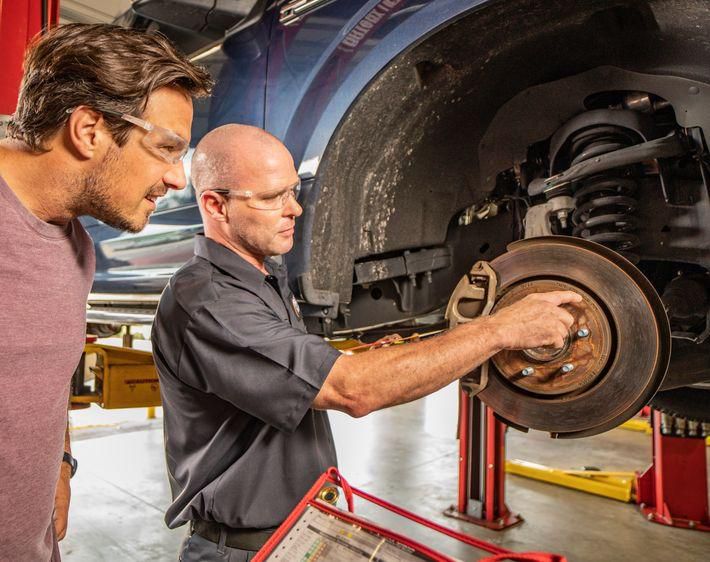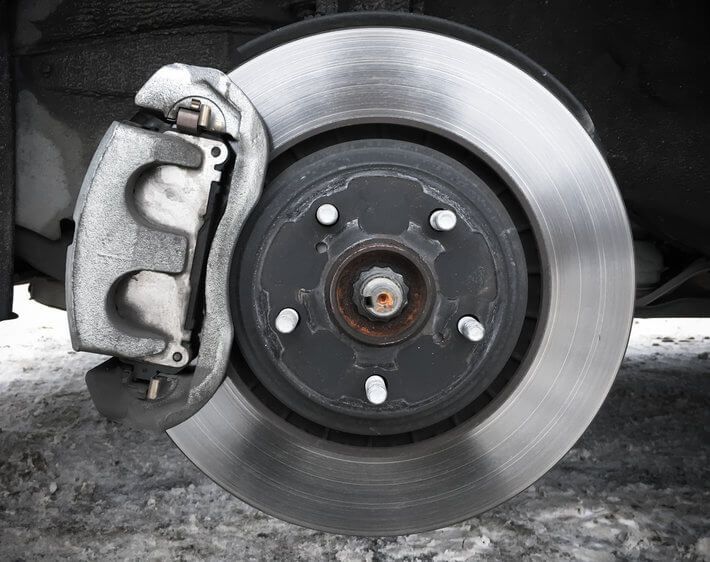You're driving home from work. An accident causes the car in front of you to stop suddenly, so you slam on your brakes. But your car doesn't stop right away.
It stops on time—narrowly!—but not as quickly as you expected. That was a close one.
There’s a good chance you just experienced brake fade. But, what is it exactly? And more importantly, what can you do to avoid it?
What Is Brake Fade
Brake fade describes what happens when you experience a sudden decrease in braking ability.
Brake fade happens when the braking system components no longer generate the friction needed to stop your car in an appropriate amount of time or distance. To stop the car, you have to press the brake pedal farther down and for longer than before.
Brake fade means your brakes aren't as responsive as they once were—and you can feel the difference.
What Causes Brake Fade
To stop, cars with disc brakes rely on a system made up of calipers, pistons, pads, and rotors (among other parts). Hitting the brake pedal activates the calipers, which in turn causes the pistons to press the brake pads against the spinning brake rotors. The friction caused by the brake pads pressing against the rotors stops the car.
Pressing metal brake pads against a spinning rotor generates a lot of heat. How much? Brake pads are designed to withstand temperatures of up to 700°F. Some brake pads are even rated for temperatures as high as 1,200°F, which is hot enough to light a batch of cookies on fire and melt the aluminum baking sheet!
But your brake pads typically don't get this hot. You apply your brakes for a few seconds here and there, which gives the heat time to dissipate.
Brake fade occurs when the heat doesn't have time to dissipate, like when you keep your foot on the brake pedal in stop-and-go traffic, drive aggressively, brake down a long hill, or drive with an overloaded vehicle. When there's an excessive buildup of heat, your brakes will start to feel less responsive and you might experience brake fade.
Other Types of Brake Fade
Aside from the brake fade scenario mentioned above, there are two less common situations in which brake fade can happen.
- Brake Fluid Fade: Brake fluid fade can happen when water in the vehicle’s brake fluid overheats from all the friction. That overheated water boils into steam, which reduces the effectiveness of your brakes. When brake fluid fade occurs, pressing down on the brake pedal may result in a soft or “spongy” feeling.
- Worn Brake Pads: The third type of brake fade happens when heat generated by braking causes the resin in certain brake pads to degrade. When resin breaks down, it releases gas which creates a film between the brake pads and rotors. This film makes it harder for the brake pads and rotors to create enough friction to bring your car to a stop.
What Helps Prevent Brake Fade?
Your driving style can play a significant role in whether your car develops brake fade. Try these three tips to help avoid brake fade.
Steer clear of aggressive driving.
Quick stops and fast starts, forceful braking during bumper-to-bumper traffic, and similar tactics can all increase the likelihood of brake fade—as well your chances of getting a traffic ticket!
Use engine braking.
When driving down hilly, winding roads, try downshifting to slow down instead of keeping your foot on the brake pedal. Pay attention to traffic and driving conditions so you can slow your vehicle by letting up on the accelerator rather than slamming on the brakes. That also means no talking on your cell phone or eating while driving!
Show your brakes some TLC.
Don’t wait until a problem arises. Have your brake pads checked for wear at least once a year or as recommended by your vehicle manufacturer. Kill two birds with one stone by replacing your brake fluid during the same trip, if necessary.
What To Do If You Suspect Brake Fade
Everyone likes to have a little power under the hood of their car, but braking is more important than horsepower when it comes to safety.
How important? Following an exhaustive study, the National Highway Traffic Safety Administration determined that bad brakes accounted for nearly 25% of all accidents involving faulty equipment.
Brakes are serious business. If you ever encounter brake fade, turn to a qualified technician to assess the situation. Brake fade that's due to excessive heat buildup is likely to go away once your brakes have cooled down, but some types of brake fade don't fade away with time.
At your local Tires Plus, we're ready to handle all of your brake needs, from inspection to repairs and maintenance. Schedule a quick brake check today. Our technicians will help banish brake fade worries!



